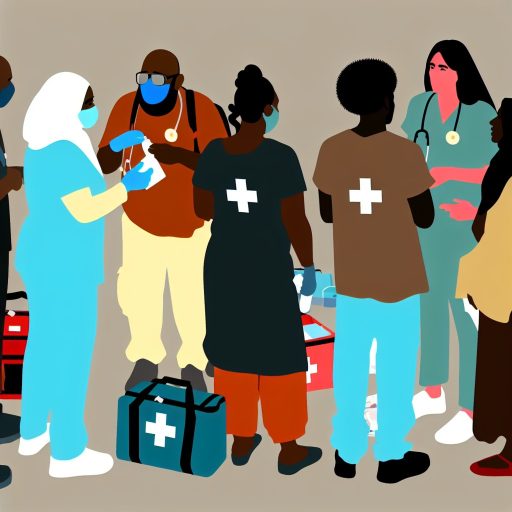Introduction
Becoming a certified victim advocate involves fulfilling specific requirements and training.
A victim advocate provides support, resources, and guidance to individuals who have experienced trauma or victimization.
They play a crucial role in helping victims navigate the criminal justice system and access necessary services.
Duties and Responsibilities of a Victim Advocate
Victim advocates provide emotional support to individuals who have experienced trauma.
They offer resources and information tailored to each victim’s needs.
Advocates act as liaisons between victims and the criminal justice system.
They help victims understand their rights and available options.
The Role of Empathy in Victim Advocacy
Empathy is essential for victim advocates to connect with individuals deeply.
This skill enables advocates to provide personalized and meaningful support.
By empathizing with victims, advocates create safe and trusting environments.
Such environments encourage victims to share their experiences openly.
Confidentiality’s Crucial Importance for Victim Advocates
Confidentiality protects the privacy of individuals seeking help from victim advocates.
Victim advocates must follow strict confidentiality guidelines consistently.
Maintaining confidentiality builds trust between advocates and victims.
It also ensures the credibility and integrity of the services provided.
The Significance of Advocacy in Supporting Victims
Advocacy is the core responsibility of victim advocates.
Advocates represent the interests and needs of victims effectively.
They empower victims to navigate complex legal systems and access resources.
Ultimately, advocates help victims regain control over their lives.
Obtain a Bachelor’s Degree
Importance of having a bachelor’s degree:
Transform Your Career Today
Unlock a personalized career strategy that drives real results. Get tailored advice and a roadmap designed just for you.
Start NowA bachelor’s degree is essential for becoming a certified victim advocate.
It provides foundational knowledge and skills needed to support victims of crime effectively.
Fields such as social work, psychology, or criminal justice offer relevant education.
Students learn about trauma, victimology, crisis intervention, and advocacy techniques.
This knowledge is crucial for understanding complexities of victimization.
It also enables providing appropriate support to individuals in need.
Specific courses or programs that may be beneficial:
Aspiring victim advocates should enroll in programs focused on victim services.
Trauma-informed care and advocacy skills are important program elements.
Courses such as Introduction to Victimology and Trauma Counseling are particularly relevant.
Crisis Intervention and Advocacy Strategies are also key courses to consider.
Programs offering internships or practicum experiences in victim advocacy settings add value.
They provide hands-on training and insight into the victim advocacy field.
Learn More: Online Resources for Domestic Violence Counselors
When it comes to becoming a certified victim advocate, gaining relevant experience is crucial.
This can be achieved through internships, volunteer work, or entry-level positions.
These opportunities exist in victim advocacy organizations.
Importance of Gaining Experience
- Provides firsthand exposure to the challenges faced by victims.
- Allows for hands-on application of advocacy skills.
- Builds a strong foundation of knowledge in victim advocacy.
- Helps aspiring advocates understand the dynamics of trauma and recovery.
- Develops empathy and compassion for individuals who have experienced trauma.
Skills and Knowledge Acquired Through Experience
- Effective communication skills for interacting with victims and other professionals.
- Understanding of legal and ethical considerations in victim advocacy.
- Knowledge of resources available to support victims in their recovery process.
- Ability to provide emotional support and crisis intervention to individuals in need.
- Experience in navigating the complexities of the criminal justice system on behalf of victims.
Gaining practical experience in victim advocacy organizations is invaluable.
It helps individuals seeking certification develop necessary skills, knowledge, and empathy.
These qualities enable effective support and advocacy for people who have experienced trauma.
Transform Your Career Today
Unlock a personalized career strategy that drives real results. Get tailored advice and a roadmap designed just for you.
Start NowFind Out More: Community Outreach Coordinator Job Interview Tips
Complete a Victim Advocacy Training Program
Overview of Different Types of Victim Advocacy Training Programs Available
- Online training programs offer flexibility and convenience for individuals.
- They accommodate busy schedules or those living in remote areas.
- In-person training workshops provide hands-on experience.
- They create opportunities for networking with professionals in the field.
- Combination programs offer both online courses and in-person workshops.
- They cater to different learning styles effectively.
Benefits of Completing a Certified Training Program in Victim Advocacy
- Certified training programs provide specialized knowledge and skills.
- They help you effectively advocate for victims of crime.
- Completing a certified program enhances your credibility.
- This demonstrates your commitment to victim advocacy.
- Certified advocates are more likely to advance their careers.
- They have greater chances of securing higher-paying positions.
- Training programs offer valuable networking opportunities.
- Networking can lead to partnerships and referrals in the field.
- Certified training educates advocates on legal procedures.
- This includes regulations related to victim rights and services.
- Completing certified training keeps advocates updated on the latest trends.
- It promotes continuous learning and best practices in advocacy.
- Training helps develop leadership, communication, and advocacy skills.
- Such skills are necessary for professional growth.
- Employers prefer candidates with certified advocacy training.
- This preference increases job opportunities in the field.
- Certified programs emphasize ethical standards and guidelines.
- These ensure professionalism and integrity for advocates.
- Advocates gain personal fulfillment from helping victims.
- They find satisfaction in guiding victims through challenges.
- They assist victims in accessing necessary resources.
You Might Also Like: What Does a Community Outreach Coordinator Do?
Obtaining certification as a victim advocate involves several steps.
It is crucial to understand the process and qualifications to become certified.
Requirements and Qualifications
- Education: Most certification programs require at least a bachelor's degree in social work, psychology, criminal justice, or a related field.
- Training: Completion of specialized training programs focused on victim advocacy is essential.
- This training can include workshops, seminars, and continuing education courses.
- Experience: Many programs require practical experience working directly with victims of crime or trauma.
- Background check: A clean criminal background check is typically required to ensure client safety.
- References: Providing letters of recommendation from professionals familiar with your advocacy skills may be necessary.
Research different certification programs and their specific requirements.
Determine which program aligns with your qualifications and career goals.
Some organizations require passing certification exams to become certified.
After meeting all requirements, you can apply to become a certified victim advocate.
The process may include submitting an application, attending interviews, and completing assessments.
Once you complete certification successfully, you will receive your certification credential.
This credential shows your commitment to helping victims of crime and trauma.
It can open opportunities for career advancement and professional growth.
Find Out More: Building a Volunteer Database: Best Practices

Continuing education and professional development help victim advocates stay current.
Certified advocates must keep up with developments in victim advocacy.
Importance of Continuing Education
Continuing education is essential for victim advocates to stay up-to-date.
Laws, policies, and best practices often change and require continual learning.
Staying informed ensures advocates provide the best support to survivors.
Resources for Continuing Education
Victim advocates have access to various resources for further education.
- Online courses: Platforms like Coursera and Udemy offer victim advocacy courses.
- Workshops and seminars: Local groups host training events for advocates.
- Conferences: Experts share knowledge during attendance at conferences.
- Webinars: Online webinars provide convenient learning opportunities.
- Professional certifications: Advanced certifications boost an advocate’s credibility.
Opportunities for Professional Development
Professional development helps victim advocates grow in their roles.
Transform Your Career Today
Unlock a personalized career strategy that drives real results. Get tailored advice and a roadmap designed just for you.
Start NowNetworking and mentorship programs broaden advocates’ perspectives.
Seeking leadership roles advances an advocate’s career further.
Participating in advocacy campaigns and community outreach expands impact.
Continuous learning and development enable advocates to make a difference.
When aspiring to become a certified victim advocate, joining professional organizations is a crucial step in your journey.
These organizations offer a wide range of benefits that can enhance your knowledge.
They also improve your skills and expand your network in the field.
Benefits of Joining Professional Organizations for Victim Advocates
- Access to Networking Opportunities
- Professional Development Resources
- Support and Guidance
Professional organizations provide a platform for victim advocates to connect with other professionals in the field.
Networking can lead to collaborations, job opportunities, and sharing of best practices.
Membership in professional organizations grants access to a wealth of resources that can help victim advocates enhance their skills.
These resources may include training sessions, webinars, conferences, and workshops.
Being part of a professional organization means having a support system that understands the challenges of being a victim advocate.
Members can provide guidance, advice, and emotional support to one another.
Networking Opportunities
Professional organizations often host events such as conferences, workshops, and seminars.
Victim advocates can meet and interact with peers, experts, and leaders in the field.
These events provide opportunities to learn from others, share experiences, and build professional relationships.
Professional Development Resources
Membership in professional organizations gives victim advocates access to a wide range of resources.
These resources are designed to enhance their skills and knowledge.
They may include online courses, webinars, publications, and mentorship programs.
Support Available through Membership
Joining a professional organization means being part of a community that understands the unique challenges faced by victim advocates.
Transform Your Career Today
Unlock a personalized career strategy that drives real results. Get tailored advice and a roadmap designed just for you.
Start NowMembers can offer support, guidance, and a sense of camaraderie.
Such support can be invaluable in a demanding profession.
Joining professional organizations as a victim advocate provides numerous benefits to enhance your career and personal growth.
From networking opportunities to access to professional development resources and a supportive community, these organizations play a vital role in your journey.
Pathway to Becoming a Certified Victim Advocate
Becoming a certified victim advocate starts with obtaining a relevant bachelor’s degree.
Choose degrees in psychology or social work to build a strong foundation.
Next, gain experience working with crime victims through internships or volunteer roles.
Complete a victim advocacy training program to enhance your skills and knowledge.
Afterward, obtain certification from a recognized organization such as the National Organization for Victim Assistance (NOVA).
Continuously stay updated on best practices to provide quality support to those in need.
Making a Positive Impact Through Victim Advocacy
Pursuing a career as a certified victim advocate is a noble and rewarding path.
Individuals passionate about helping victims of crime can make a real difference.
By following these steps, you dedicate yourself to improving lives within communities.
Do not hesitate to take the first step toward becoming a certified victim advocate today.
Additional Resources
Victim Witness – Sacramento County District Attorney’s Office
Health Care Practitioner Human Trafficking Training | Texas Health …
[E-Books for Sale]
The Big Book of 500 High-Paying Jobs in America: Unlock Your Earning Potential
$19.99 • 500 High-Paying Jobs • 330 pages
Explore 500 high-paying jobs in America and learn how to boost your career, earn more, and achieve success!
See All 500 High-Paying Jobs of this E-Book
1001 Professions Without a Degree: High-Paying American Jobs You Can Start Now
$19.99 • 1001 Professions Without a Degree • 174 pages
Discover 1001 high-paying jobs without a degree! Unlock career tips, skills, and success strategies for just $19.99!




